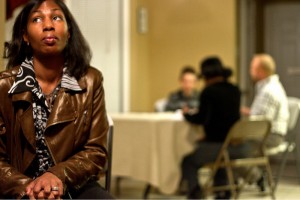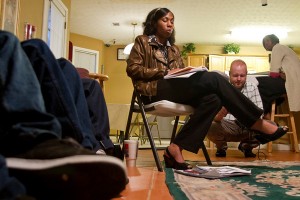 I was still in Columbus, Ohio wrapping up my Kiplinger Public Affairs Journalism Fellowship at the Ohio State University when I first heard about Dr. Adia Winfrey’s H.Y.P.E. Hip-Hop Therapy. I came across it while attempting to locate some information on hip-hop’s global impact for a fellow classmate. It turned out to be yet another jewel of a find, during one of my famous (maybe infamous?) insomnia-driven Google searches that tend to take place in the wee hours of the morning. I was so very intrigued by the concept of using hip-hop as a vehicle to help troubled kids open up in therapy, that I couldn’t stop reading about it. My enthusiasm soared when I realized that “Dr. Dia,” as her clients call her, was based in the metro Atlanta area. Once I accepted the job as a reporter for JJIE.org, I knew that H.Y.P.E. would be on my “story ideas” roster.
I was still in Columbus, Ohio wrapping up my Kiplinger Public Affairs Journalism Fellowship at the Ohio State University when I first heard about Dr. Adia Winfrey’s H.Y.P.E. Hip-Hop Therapy. I came across it while attempting to locate some information on hip-hop’s global impact for a fellow classmate. It turned out to be yet another jewel of a find, during one of my famous (maybe infamous?) insomnia-driven Google searches that tend to take place in the wee hours of the morning. I was so very intrigued by the concept of using hip-hop as a vehicle to help troubled kids open up in therapy, that I couldn’t stop reading about it. My enthusiasm soared when I realized that “Dr. Dia,” as her clients call her, was based in the metro Atlanta area. Once I accepted the job as a reporter for JJIE.org, I knew that H.Y.P.E. would be on my “story ideas” roster.

Winfrey looks on as WABE's Jim Burress and I interview H.Y.P.E. participants/PHOTOS BY CLAY DUDA
I returned to Atlanta soon thereafter and contacted Dr. Winfrey (and yes, she’s a distant relative to Oprah by marriage). It would take several months of emailing back and forth and eventually a phone conversation or two to finally nail down the right time to do the story, but Dr. Dia always kept me abreast of what was happening on her end. Finally she mentioned that she would be working with some young men from a group home and she invited me to sit in on a session. The timing could not have been more perfect, as I was just establishing a professional relationship with WABE (90.1 FM), Atlanta’s National Public Radio (NPR) affiliate. The music made this an ideal radio story and it was also a great opportunity for JJIE.org, a start-up, to partner with a well-established news operation.
Finally the day came for anchor/reporter Jim Burress, JJIE.org photographer/social media guru Clay Duda to join me in covering a H.Y.P.E. session. At first it was quite bizarre, observing a non-descript white van filled up with teenagers pull up to this nice brick two-story home off a cul de sac in Lithonia. Let’s just say one would not necessarily expect a therapy session to take place in the living room of a home in this quiet middle class neighborhood. Dressed in an Atlanta Falcons hoodie, attendee Chris* greeted us at the door and welcomed us inside. [Check out our H.Y.P.E. report from WABE 90.1 FM]
After brief introductions, our crew stepped back and watched Dr. Winfrey take charge. I found the session to be quite amazing; her approach innovative. Sure some of the five teenage boys sprinkled around the room didn’t say much, but most of them did. Within 30 minutes of meeting, they were sharing the intimate details of their young lives in our presence -- MIA parents, gangbanging, drug dealing, teen parenting and trouble at school to name a few. In short, lives filled with chaos, disorder and lots of pain and loss. Soon their stories began to mirror the exploits shared in many popular hip-hop songs that I sometime bob my head to while cruising in my car. I often haphazardly write off these tales as entertainment, but that was not an option for these young men. I honestly didn’t expect the teens to open up as much as they did. I would imagine that it was hard enough for them to deal with these harsh realities, and now that they’ve mustered the courage to talk about it here’s one stranger sticking a mic into their face, while another stranger (me) took notes about what they said. I hope that these young men know how much we appreciate them allowing us to listen in. We hope that this report will give readers and listeners some insight into their lives.

Burress records Winfrey's H.Y.P.E. session.
As I backed out of the cul de sac a few hours and a few interviews later, I felt enlightened by these young men and their life experiences. I also felt very curious and optimistic about hip-hop’s ability to heal these young people and others with the weight of the world on their shoulders. Dr. Dia’s passion is evident and her ability to hold her own as “therapist” while relating authentically to her young clients as a true hip-hop fan was extraordinary, to say the least.

A H.Y.P.E. participant illustrates his "broken heart."
I know some people will hear/read this report and cringe at the mere notion that hip-hop music is anything more than just gratuitous entertainment. Everyone’s entitled to his or her own opinion, but I have to agree with doc on this one when she says, “anyone who criticizes hip-hop, I challenge them to try and sit down and write a story and make it rhyme to a beat. They’ll see how hard it really is.” I’ve tried to write poems and let’s just say, they didn’t flow so easily and I write for a living. The fact of the matter is that to Dr. Winfrey’s clients and many others the lyrics to some of the most salacious hip-hop songs are a sobering reminder of real life not fiction. The underlying messages of frustration, fear, sadness and anxiety seemed to resonate with the group we observed. And I suspect it could do the same for others. And maybe, just maybe, H.Y.P.E. truly does have the ability to heal through hip-hop.
___________________________
Got a juvenile justice story idea? Contact JJIE.org staff writer Chandra R. Thomas at cthom141@kennesaw.edu. Thomas, a former Rosalynn Carter Mental Health Journalism Fellow and Kiplinger Public Affairs Journalism Fellow, is an award-winning multimedia journalist who has worked for Fox 5 News in Atlanta and Atlanta, People and Essence magazines.
I am moved by the interest and exposure for the use of Hip Hop in therapy with youth. I have been doing similar work for more than 12 years and its refreshing that people are finally starting to take Hip Hop scholarship and practice seriously. Nice work Ms. Thomas.